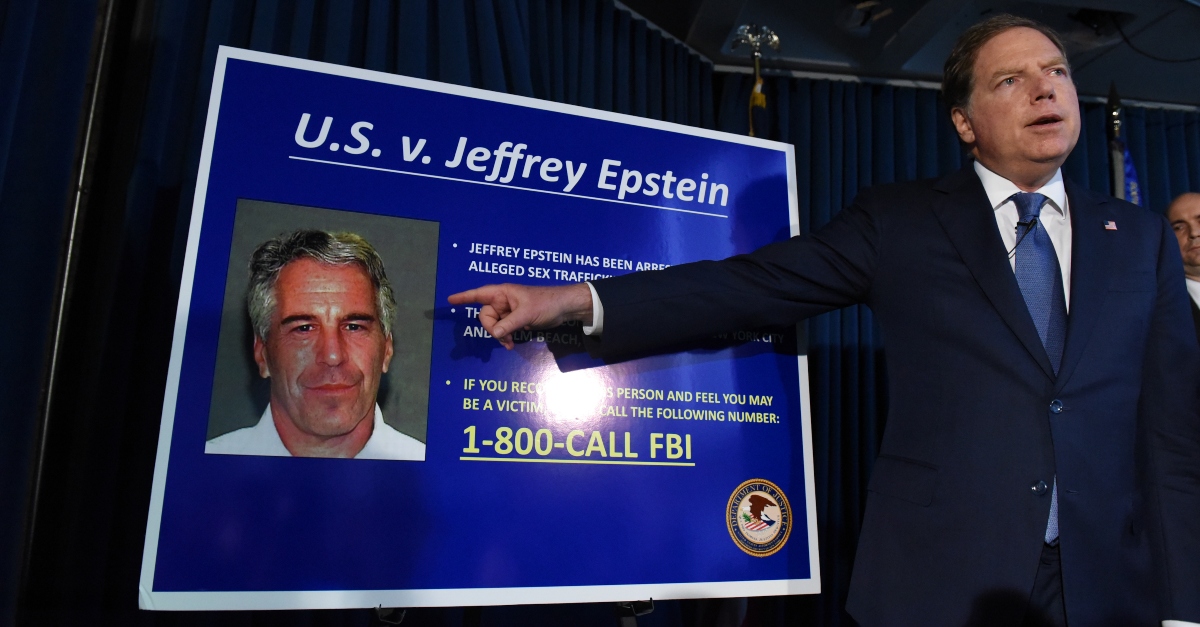
Federal prosecutors for the Southern District of New York want to keep convicted sex offender Jeffrey Epstein, 66, locked up ahead of trial in his new federal case. The defendant is charged with sex trafficking and conspiracy to commit sex trafficking.
In a new detention memo, authorities say that Epstein can’t be trusted if he’s let out pre-trial because there’s a chance he might try to intimidate witnesses; he’s a huge flight risk; he allegedly possessed nude photos of what appear to be underage girls, and is a registered sex offender.
1. Epstein Might Intimidate Witnesses, Prosecutors Say
Authorities argue that Epstein might “pressure and intimidate witnesses and potential witnesses,” based on prior experiences. This includes victims, and their families. Authorities voiced concern that Epstein might try to obstruct justice:
The defendant’s apparent previous willingness to obstruct a federal investigation, harass or tamper with witnesses, and hire private investigators that “forc[ed] off the road” the father of an individual relevant in the investigation is alarming. It should especially weigh on the Court’s consideration here because the defendant was apparently willing to take those steps before even being charged and thus facing federal indictment; the incentive to interfere in the Government’s case here, where an Indictment has been returned, is exponentially greater. And as discussed above, the defendant has nearly limitless means to do so.
They also argued that Epstein is a huge flight risk. Epstein made his money as a financier. With his wealth, Epstein purchased homes in the U.S. Virgin Islands, Palm Beach in Florida, Manhattan, New Mexico, and Paris. He has enough money and international connections to successfully escape, authorities say.
Finally, there can be little doubt that the defendant is in a position to abandon millions of dollars in cash and property securing any potential bond and still live comfortably for the rest of his life. These resources, and the ease with which the defendant could flee and live outside the reach of law enforcement—particularly considering his vast wealth and lack of meaningful ties to this District—make the risk of flight exceptionally high in this case, particularly when considered in conjunction with the strength of the government’s case and the lengthy sentence the defendant could receive if convicted.
Epstein was arrested over the weekend after returning the the U.S. on his private jet from Paris.
2. A Recent Raid Turned Up Evidence That He Possessed Photos of Apparently Underage Girls
As you may already know, prosecutors said that nude photos were seized this weekend from Epstein’s home in the Upper East Side of Manhattan.
The detention memo said there were hundred, if not thousands, of “sexually suggestive” pictures of fully- or partially-nude women and girls. Some of them seem to be of underage girls, authorities wrote. This included “at least one girl who, according to her counsel, was underage at the time the relevant photographs were taken.” Some of these pictures were found in a locked safe with CDs featuring labels reading stuff like, “Young [Name] + [Name],” “Misc nudes 1,” and “Girl pics nude.”
Mind you, Epstein is a registered sex offender. Prosecutors argue that Epstein has shown no remorse and that he is a “continuing danger to society,” meaning he should be detained pre-trial. From the memo [citation removed]:
The defendant, a registered sex offender, is not reformed, he is not chastened, he is not repentant … rather, he is a continuing danger to the community and an individual who faces devastating evidence supporting deeply serious charges.
3. Non-Prosecution Agreement Has No Bearing on This Case, Prosecutors Say
Epstein infamously reached a non-prosecution agreement in 2007 with the U.S. Attorney’s Office for the Southern District of Florida in exchange to pleading guilty to charges in state court. The federal prosecutors in the new case are working out of New York. They say this agreement has nothing to do with them; their office didn’t sign off on it and, besides, the agreement didn’t claim to cover crimes outside of Florida. Under case law in the Second Circuit Court of Appeals, a plea agreement in one U.S. Attorney’s office doesn’t bind another, they argue.
Authorities also point to dozens of victims abused in their district, and dozens abused in Florida, according to the memo. The statute of limitations is not an issue in this case, they said.
You can read the full detention memo below:
Government’s Jeffrey Es… by on Scribd
[Image via Stephanie Keith/Getty Images]